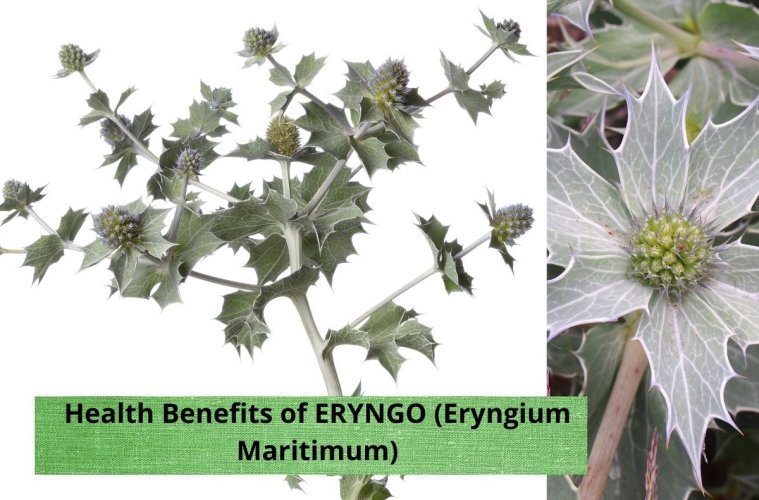Did you know that there are many health benefits of eryngo? This lesser-known herb has been used for centuries to treat various conditions.
Eryngo is a type of thistle that is found in coastal areas. The leaves and flowers can be used to make a tea or tincture, which can be used to treat a variety of illnesses.
Today, we will discuss the traditional uses and benefits of eryngo and how to prepare and use it.
Contents
Common names
Eryngo is a plant with many common names, including eryngo, sea holly, Spanish bluebells, Maritime Eryngo, and bishop’s weed. The most prevalent of these is “sea holly,” which can be found on plants worldwide.
Habitat
It is native to the Mediterranean region but can also be found in North Africa, Asia, and Europe.
The eryngo plant is a hardy perennial found in coastal areas and near the seashore. It grows best in sandy, well-drained soil and prefers full sun to partial shade.
The eryngo plant blooms from July through September with tall spikes of blue flowers. This plant is often used as a dried flower arrangement.
Description
Eryngo is a biennial or perennial herbaceous plant of the Apiaceae family.
The eryngo has a thick, white, fleshy taproot from which arises a stout, erect stem up to tall. The leaves are alternate, simple, divided into three deeply lobed leaflets, and have a strong smell of parsley when crushed.
The flowers are small, arranged in flattened umbels, which may be white, blue, or purple. The fruit is an oblong schizocarp containing two seeds.
Part used
The eryngo is used as food for humans and animals. The young leaves can be eaten raw or cooked and are high in vitamins and minerals.
The roots can also be eaten raw or cooked and are a good source of carbohydrates, proteins, and essential fatty acids.
The flowers can be used to make herbal tea, which helps treat respiratory problems. The fruits are edible but not very tasty.
Traditional Uses and Benefits
Eryngo helps improve prostate problems. The oil from the plant effectively relieves urinary difficulties and other symptoms associated with an enlarged prostate gland. It also helps reduce inflammation and acts as a diuretic, helping to increase urine flow.
ERYNGO helps clear the airways and loosen mucus, making it easier to expel. Additionally, it is a natural expectorant, meaning it can help the body expel phlegm.
It helps clear the respiratory passages and lungs, so it is often recommended for bronchitis.
Traditionally it has been used to treat renal calculi and bladder stones. It helps dissolve kidney stones and prevent their formation.
This herb also has anti-inflammatory properties that help reduce inflammation and speed up the healing process. It helps relieve pain and swelling in the kidneys.
ERYNGO is a natural diuretic that helps increase urine flow. It also contains potassium, which prevents fluid retention by balancing sodium levels in the body. ERYNGO has been used to treat edema and water retention associated with kidney disease or congestive heart failure.
Eryngium maritimum is also a good source of silicon, which is known to be beneficial for the skin. Silicon helps keep connective tissue healthy, including collagen and elastin, which are important in maintaining the youthful appearance of skin.
How to Use Eryngo (Eryngium Maritimum)
Eryngo is a plant that has many benefits, but it should be used with caution. It can help improve digestion, respiratory problems, and menstrual pain. It can also be used to expel intestinal parasites and as a diuretic.
The roots should be chopped and boiled in water for about 20 minutes to prepare Eryngo. The infusion can then be drunk three times a day. For best results, it should be taken on an empty stomach.
The leaves of the plant can also be eaten raw or cooked. They are very bitter, so they are not usually eaten on their own. They can be added to salads or cooked dishes.
Dosage and Precautions
Eryngium Maritimum should not be taken by pregnant women or people allergic to plants in the Apiaceae family.
The recommended dosage of eryngo depends on the condition. The suggested dosage is two grams per day of the powdered herb mixed with water or juice for respiratory problems.
For hypertension, the suggested dosage is five grams per day of the powdered herb mixed with water or juice. And for digestive disorders, the recommended dosage is ten grams per day of the powdered herb mixed with water or juice.
Before taking Eryngium Maritimum or any other herbal supplement, always consult a healthcare professional.
I hope you find these common herbs helpful!
References
- https://www.rxlist.com/eryngo/supplements.htm
- https://www.webmd.com/vitamins/ai/ingredientmono-6/eryngo
- https://www.healthbenefitstimes.com/sea-holly/
- https://en.wikipedia.org/wiki/Eryngium_maritimum
DISCLAIMER
The content and information on newerapost for information and educational purposes only. It is not for self-diagnosis and self-treatment. The content is not a medical manual. Before beginning the use of any prescription, medication and pursuing any self-treatment, all readers should consult a physician.
The information given in this article is intended to help you make informed decisions for your health. You must consult with your doctor before pursuing any natural remedies if you are under care for any health condition.
Do not take any vitamins, minerals, herbs, or other supplements without consulting your doctor, if you are taking any medication. The website does not make a representation, express or implied, regarding the accuracy of the information and does not accept any single responsibility for any errors or misuse.

